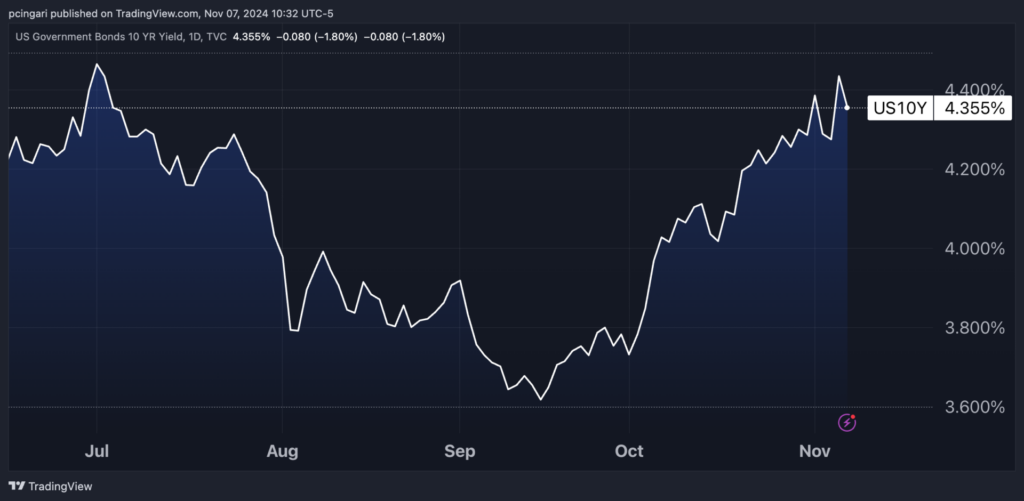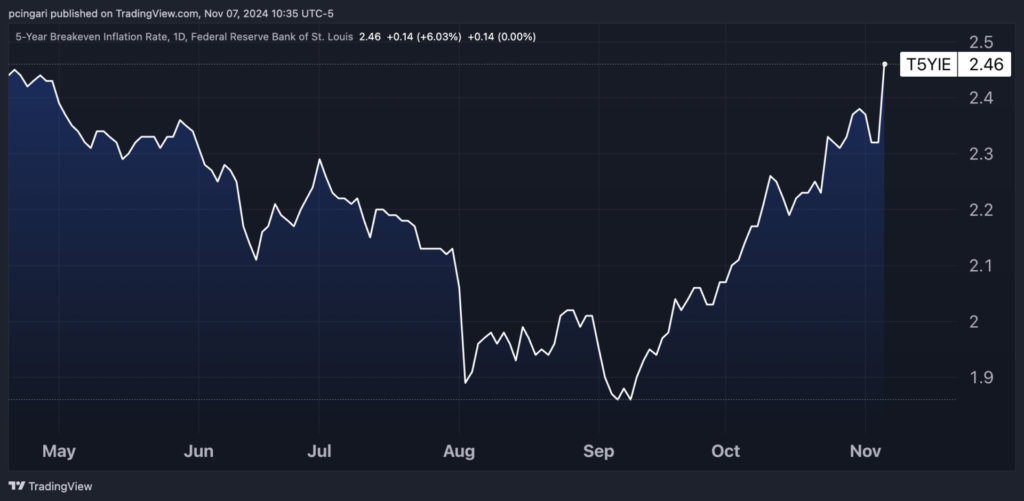Zinger Key Points
- The 10-year Treasury yield surges from 3.6% to 4.35% in under two months, reflecting market concerns over inflation and fiscal policy.
- Economists warn that Trump's tariff hikes could further fuel inflation, putting pressure on the Fed to tighten policy.
- Get 5 stock picks identified before their biggest breakouts, identified by the same system that spotted Insmed, Sprouts, and Uber before their 20%+ gains.
Rising U.S. Treasury yields and a strengthening in the value of the dollar in the wake of Donald Trump's return to the White House are threatening to counteract the Federal Reserve's efforts to lower interest rates.
The Federal Reserve is expected to cut its benchmark interest rate by 25 basis points on Thursday, marking a back-to-back reduction and bringing the policy rate to a range of 4.5%-4.75%, the lowest since February 2023.
The bond market appears less influenced by the Fed's dovish stance and more by the fiscal and inflationary implications of Trump's victory in the 2024 presidential election.
Trump's Fiscal Plans Drive Deficit Concerns
Trump's proposed fiscal policies are expected to add significantly to the U.S. national debt.
According to the nonprofit Committee for a Responsible Federal Budget (CRFB), Trump’s tax and spending plans could increase the federal deficit by approximately $7.75 trillion between 2026 and 2035 in a baseline scenario.
This would push the debt-to-GDP ratio from 102% to a staggering 143%, or 18% higher than current law projections.
In a high-deficit scenario, the CRFB estimates that deficits could swell by $15.55 trillion, elevating the debt-to-GDP ratio to 157%.
Such a sharp rise in the national debt would necessitate a sharp increase in Treasury issuance by the government in the upcoming years, putting upward pressure on yields as investors demand higher returns to offset heightened risks of fiscal instability.
On top of that, Trump's pledge to raise import tariffs — by 60% on goods from China and 10% on imports from other countries — is widely viewed by economists as an inflationary move.
Treasury yields have surged sharply in under two months, with the 10-year yield climbing from 3.6% to 4.35%. As a result, the U.S. 10 Year Treasury Note ETF UTEN has fallen by over 5% since its September highs.
Chart: 10-Year Treasury Yields Spike, Anticipate Worsening Debt Path After 2024 Elections

Rising Yields Complicate Fed's Easing Path
In the meantime, the Fed cut interest rates by 50 basis points in September and guided investors toward a further cut in November, a stance that would typically lower borrowing costs and ease financial conditions.
The bond market's reaction has been the opposite, creating tighter financial conditions that investors wouldn't normally expect under a Fed easing bias.
In addition to rising yields, the U.S. dollar has also strengthened significantly.
“Bond yields are rising for a good reason, as the economy is holding up stronger than expected and markets are also pricing in continued government spending and the potential for widening deficits,” said Glen Smith, chief investment officer at GDS Wealth Management.
The recent spike in yields is undermining the Fed's attempts to ease financial conditions, the CIO said.
“Rising bond yields are reversing the Fed’s efforts to loosen policy, as bond yields determine the interest rates that consumers pay on mortgages and credit cards,” he said.
Smith suggested Thursday’s expected rate cut could be the last for a while, as the Fed might pause its rate cuts in December and into 2025 if the economy remains resilient and disinflation slows.
Inflation Expectations Spike With Trump Win
Trump's return to the White House has heightened inflationary concerns.
The five-year breakeven inflation rate, a widely watched gauge of inflation expectations derived from Treasury yields, rose by 14 basis points to 2.46% on Wednesday.
This shift indicates that investors are now anticipating inflation to average 2.5% over the next five years, well above the Fed's 2% target.
Russell Shor, senior market specialist at Jefferies-owned trading platform Tradu, warned that Trump's policies could push inflation even higher.
"With Trump's return to the White House, the Fed may feel pressure to tighten its stance on inflation. His tariff and immigration plans could drive up prices, and the central bank will be watching closely for any inflation resurgence," Shor said.
Chart: 5-Year Breakeven Inflation Rate Spikes To Nearly 2.5% After Trump’s Election Victory

Read Next:
Image created using Shutterstock and Fed photos with a background created using artificial intelligence via MidJourney.
Edge Rankings
Price Trend
© 2025 Benzinga.com. Benzinga does not provide investment advice. All rights reserved.
Trade confidently with insights and alerts from analyst ratings, free reports and breaking news that affects the stocks you care about.